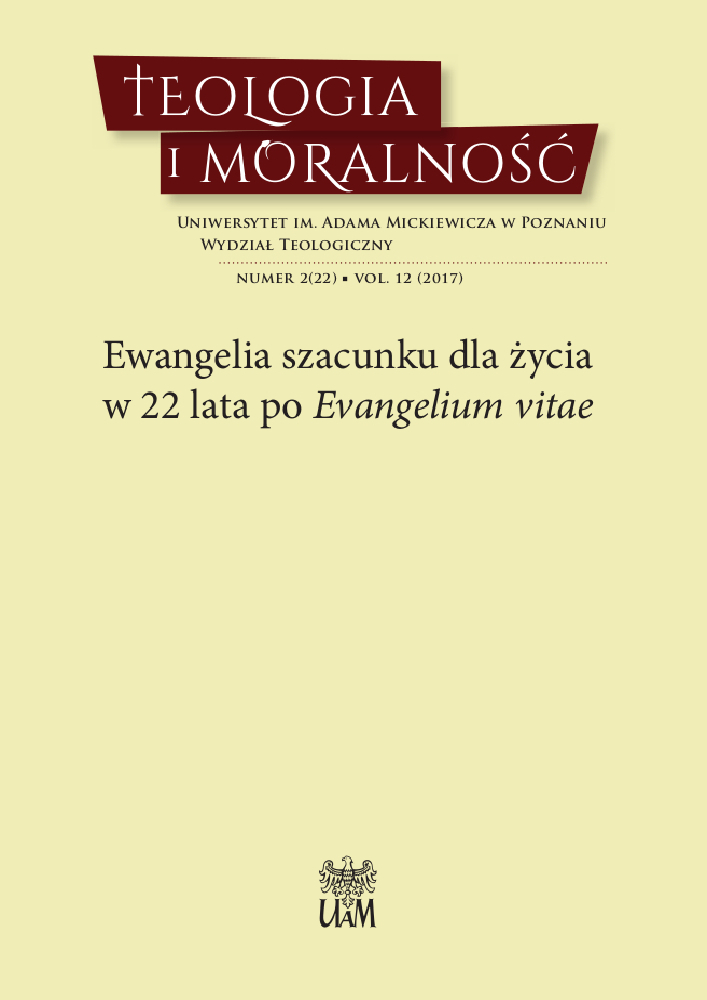Abstract
The analysis of the mystery of life can be helpful to overcome the current crisis of woman’s and a man’s sexual/gender identity caused by radical theses of the gender ideology. In the light of biblical anthropology we can know better the multidimensional nature of human life. The life-cycle mystery is closely linked with the process of life transmitting. The woman and man have received from God the capability and mission to transmit life. This ability inscribed in the nature of the person expresses the essential feature of their vocation as beings created in the image of God. Woman and man should to be life-giving, as God is the life-giving Creator. The negation of this life-giving aspect of human nature present in the radical theses of gender ideology places this theory in obvious contradiction to the Gospel of life. For this reason the gender ideology can be considered as a serious threat not only to individual man but to all human family.References
Amato G., Gender (d)istruzione. Le nuove forme d’indottrinamento nelle scuole italiane, Verona 2015.
Bosetti E., Il mistero della vita e la sua rivelazione nella Sacra Scrittura, w: Lo splendore della vita: Vangelo, scienza ed etica. Prospettive della bioetica a dieci anni da Evangelium vitae, red. L. Melina, E. Sgreccia, S. Kampowski, Città del Vaticano 2006, s. 35-51.
Buttler J., Uwikłani w płeć, tłum. K. Krasuska, Warszawa 2008.
Connell R., Questioni di genere, Urbino 2011.
Grabowska M., Od „gender do „transgender”: ewolucja kategorii płci społeczno-kulturowej w naukach społecznych i prawie międzynarodowym, s. 2, w: http://rownosc.info/media/uploads/biblioteka/publikacje/od_gender_do_transgender_tekst.pdf [dostęp: 11.02.2017].
Mroczkowski I., Starotestamentalne rozumienie ciała, duszy i ducha człowieka, „Studia Płockie” 21(1993), s. 17-24.
Jan Paweł II, Encyklika Evangelium vitae, Kraków 1995.
Jan Paweł II, List do rodzin Gratissimam sane, Watykan 1994.
Jan Paweł II, Katechizm Kościoła Katolickiego, Poznań 1994.
Jan Paweł II, Encyklika Redemptor hominis, Wrocław 1986.
Keiser O., Der Gott des Alten Testaments: Wesen und Wirken. Theologie des AT 2, Göttingen 1998.
Kongregacja Doktryny Wiary, Persona humana, Wrocław 1993.
Kuby G., Globalna rewolucja seksualna. Likwidacja wolności w imię wolności, Kraków 2013.
Meany J., Feministyczny atak na ojcostwo, w: Międzynarodowy Kongres „O godność ojcostwa”, red. E. Kowalewska, Gdańsk 2000, s. 139-146.
Muszala A., Koncepcja człowieka według św. Pawła i jej implikacje dla bioetyki, w: K. Jasiński, Z. Kieliszek, M. Machinek, Mózg – umysł – dusza. Spór o adekwatną antropologię, Olsztyn 2014, s. 125-140.
O’Leary D., Maschi o femmine? La guerra del genere, Soveria Mannelli 2006.
Olczyk M., Ideologia gender w świetle ekologii integralnej papieża Franciszka, „Studia Bydgoskie” 10 (2016), s. 79-104.
Palazzani L., Sex/gender: gli equivoci dell’ugualianza, Torino 2015.
Schockenhoff E., Etyka życia. Podstawy i nowe wyzwania, tłum. K. Glombik, Opole 2014.
Sobór Watykański II, Gaudium et spes, 24, w: Sobór Watykański II, Konstytucje, dekrety, deklaracje, Poznań 2002, s. 526-606.
von Rad G., Teologia dell’Antico Testamento, t. 1, Brescia 1972.
Witczyk H., „Obraz Boży” w człowieku – źródło i cel działania moralnego, w: Antropologia teologicznomoralna. Koncepcje. Kontrowersje. Inspiracje, red. I. Mroczkowski, J.A. Sobkowiak, Warszawa 2008, s. 19-37.
Wolff H.W., Anthropologie des Alten Testaments, München 1990.
License

This work is licensed under a Creative Commons Attribution-NoDerivatives 4.0 International License.
